A letter from Comrade Debs in the July issue of the International Socialist Review, assailing the majority of the Committee on Immigration and its report to the national convention of the Socialist Party [National Congress, Chicago, May 15-21, 1910], has been brought to my notice but recently.
Comrade Debs calls our report "unsocialistic, reactionary, and in truth outrageous." He claims that "the plea that certain races are to be excluded because of tactical expediency would be entirely consistent in a bourgeois convention of self-seekers."
He feels that he would take his stand "upon this vital proposition" against the world and no "specious argument of subtle and sophisticated defenders of the Civic Federation unionism, who do not hesitate to sacrifice principles for numbers and jeopardize ultimate success for immediate gain" could move him to turn his back upon the oppressed, etc., etc.
Outside of such unwarranted assertions and insinuations, the letter of Comrade Debs contains nothing and winds up with an invitation to some unnamed parties to "desert" because "we" (Debs and his fellow sentimentalists) refuse to shut the international door in the faces of their own brethren, etc., etc., in the approved oratorical style.
Comrade Debs insinuates that those who offered the majority report "have no proper place in the socialist movement while they entertain such aristocratic notions of their own assured superiority." And this is the whole argument: A mass of unsupported and unwarranted assumptions and personal flings, which show that he did not take the trouble to read the arguments made by the 1 majority in support of their report, but that he at once jumped to wild conclusions as soon as he had finished his hasty perusal of the majority report. It seems to me that this letter of Comrade Debs is itself a pretty fair illustration of his "aristocratic notion of his own superiority."
I am compelled to reply that he is not the sole judge of what is "socialistic, reactionary, and outrageous," and that the majority of the committee emphatically repudiate the charge of having acted contrary to the fundamental principles of Socialism, or of having toadied to the reactionary element in the "Civic Federation unionism."
Our report contained a number of very definite propositions. If Comrade Debs wishes to argue against our report, it is his business to refute these specific points. Mere invective and sentimental oratory will not refute facts.
And it is the facts upon which we base our report that Comrade Debs has not faced. Among the definite points made by our report are the following:
1. That international solidarity can be promoted without having the workers of all nations and all races come to America. If that is so, the policy of exclusion cannot be said to be necessarily in conflict with the principle of international solidarity.
2. That the development of capitalism in Europe, Asia, and America is so far apart in the matter of time that the European immigrants, even from the most backward parts of that continent, are easily assimilable in America in the course of a few generations, whereas the immigrants from Asia are not, as more than 50 years of experience have shown.
3. The presence of the negroes in the Southern states has already burdened us with a race problem, which makes the agitation for Socialism and the effective organisation of the Socialist Party in the Southern states very difficult, so long as the race feeling between whites and negroes is a fact. The immigration of large masses of Orientals intensifies this race problem and to that extent increases the difficulties of organisation for bona fide unions and for the Socialist Party. 2
4. Whenever an issue between capitalists and laborers arises, the presence of different races invariably leads to a race issue between the workers instead of to a class issue between the workers regardless of race on one side and capitalists on the other. This overshadowing of the class struggle by a race feeling leads to reactionary results, retards the progress toward Socialism, and helps the capitalist class.
5. The great capitalists are the principle beneficiaries of Oriental immigration, and they use it consciously as a weapon against the labor unions and against the Socialist Party. By advocating a repeal of the exclusion laws and a free immigration of Orientals, the Socialist Party would be assisting the capitalists and raising its own enemies to power.
6. the exclusion of these races gives the revolutionary workers a tactical advantage and enables them so much better to drive the capitalists from power and bring about real international solidarity of the workers.
7. Any argument which ignores the difference in the environment of European and Asiatic immigrants, any insinuation that we exclude these Asiatics ON ACCOUNT OF THEIR RACE, misses the main point of the position of the majority report. In my capacity as chairman of the old and new Committee on Immigration, I shall be much obliged to Comrade Debs for any light which he may be able to shed on the truth or untruth of these propositions. I have a right to expect more than mere invective and oratory from Comrade Debs on this matter, and I await his arguments.
- A Reply to Debs by Ernest Untermann Published in Social-Democratic Herald [Milwaukee, WI], Wisconsin Edition, vol. 13, no. 16, whole no. 629 (Aug. 20, 1910), pg. 2.
..
“The Socialist Party of the United States favours all legislative measures tending to prevent the immigration of strike breakers and contract labourers, and the mass importation of workers from foreign countries, brought about by the employing classes for the purpose of weakening the organisation of American labour and of lowering the standard of life of the American workers.”
- Congress of the Socialist Party of America, 1910
...........................
When population rises, wages and conditions fall because when the supply of a good rises, its price falls. As Karl Marx said to the First International back in 1867, “in order to oppose their workers, the employers either bring in workers from abroad or else transfer manufacture to countries where there is a cheap labour force.” Or both, we should add
-V N Gelis
..........................
“The Central Council met on Tuesday evening at 18, Bouverie Street, when Mr. Lee, the secretary of the Excavators’ Society, attended to report to the Council the cause of the late disturbances between the English and Belgian Excavators. Mr. Lee said an agent of Waring Brothers had succeeded in inducing 430 Belgian workmen to come to England and work for less wages than the English workmen were being paid, and the result had been that several Englishmen had been forced out of employment to make way for the cheaper labour of the Belgians. The 430 were made up of excavators, carpenters, and blacksmiths. The Belgians were receiving from 2s. 4d. to 3s. per day, while the wages of the Englishmen, were from 3s. 9d. to 4s. per day. This lowering of wages by the Belgians had caused the late disturbances, which he and his brother members regretted. They were ready to receive the Belgians into their society. He also wished to ask on what terms the Excavators’ Society which numbered several thousands could join the International Working Men’s Association. After the question had been answered, and the whole matter fully discussed, it was resolved — ‘That in case the Excavators’ Society take steps to form a branch in the district where the disturbance occurred, that the Central Council send a delegate speaking the Belgian language to accompany the excavators’ delegates to induce the Belgians to join the Excavators’ Society, also that the Central Council use its influence to prevent the importation of any more Belgians at such reduced prices.’
........................
Q: Dear Glezos, Athens is in turmoil after the murder by immigrants of Manolis Kantaris. The Left just as like in the pre-war era and the rise of fascism, doesn’t seem to be expressing the citizens with what it stands for and they are looking towards the Far Right. What is at fault?
Glezos: This is a big problem. The situation in many suburbs is unacceptable. The people cannot live by being confronted by all this wave which exploits immigrants. The mafias of immigrants, the low lifes made up of immigrants, I do not shirk from saying it, are creating problems for the citizens.
Who is at fault for this? Let us see the root of the evil. All the European governments are at fault, in particular those which had colonies in today's under development countries (Africa Asia) which ceased to be colonial but continue to exploit these countries and don’t allow them to develop. The cause are the ex-colonialists. The govt is also at fault as its subordinate to the demands of Dublin 2 and does not do what it must. They should get everyone ask them where are you from and if they answered for example from Algeria send him packing to France! Get France to pay for this cause. They should have provided them with the right documents and send them to the colonial countries. Thirdly why should only the citizens of Ag Panteleomonas and Kipseli pay for this (immigration influx translators edit) and not Psihiko and Filothei (rich suburbs translators edit)? Another issue. The govt uses the police as an organ of oppression of social struggles, instead of an organ for the suppression of criminality. If it acted out the latter we wouldn’t have so many crimes. They would be avoided.
Q: And the Left?
Glezos: What I say it doesn’t repeat! The Left takes uncritically the side of the immigrants without condemning the criminal mafias, who act amongst the immigrants and does not distinguish the issue. From there onwards is the ground on which fascism develops. I am questioning then. Where was the Left at fault to not be able to stop the rise of fascism in the pre-war era? The question is as valid today!
- Manolis Kotakis, interviewed in the newspaper, 'Democracy'
..........................
The congress declares:
The immigration and emigration of workers are phenomena that are just as inseparable from the essence of capitalism as unemployment, overproduction and workers’ under-consumption. They are often a way of reducing the workers’ participation in the production process and on occasion assume abnormal proportions as a result of political, religious and national persecution.
The congress does not seek a remedy to the potentially impending consequences for the workers from immigration and emigration in any economic or political exclusionary rules, because these are fruitless and reactionary by nature. This is particularly true of a restriction on the movement and the exclusion of foreign nationalities or races.
Instead, the congress declares it to be the duty of organised labour to resist the depression of its living standards that often occurs in the wake of the mass import of unorganised labour. In addition the congress declares it to be the duty of organised labour to prevent the import and export of strike-breakers. The congress recognises the difficulties which in many cases fall upon the proletariat in a country that is at a higher stage of capitalist development, as a result of the mass immigration of unorganised workers accustomed to lower living standards and from countries with a predominantly agrarian and agricultural culture, as well as the dangers that arise for it as a result of a specific form of immigration.
- Stuttgart Conference 2nd International, 1907
......................
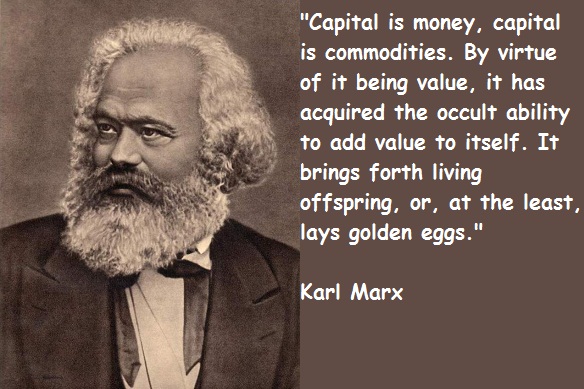
"Labour is one-third cheaper in France than in England; for their poor work hard, and fare hard, as to their food and clothing. Their chief diet is bread, fruit, herbs, roots, and dried fish; for they very seldom eat flesh; and when wheat is dear, they eat very little bread." [39] "To which may be added," our essayist goes on, "that their drink is either water or other small liquors, so that they spend very little money.... These things are very difficult to be brought about; but they are not impracticable, since they have been effected both in France and in Holland." [40] (Capital I, chap. 24) And the footnote amplifies: [40] Today, thanks to the competition on the world-market, established since then, we have advanced much further. "If China," says Mr. Stapleton, M.P., to his constituents, "should become a great manufacturing country, I do not see how the manufacturing population of Europe could sustain the contest without descending to the level of their competitors." (Times, Sept. 3, 1873, p. 8.) The wished-for goal of English capital is no longer Continental wages but Chinese.
. . .
To give an example, one of the commonest forms of the movement for emancipation is that of strikes. Formerly when a strike took place in one country it was defeated by the importation of workmen from another. The International has nearly stopped all that. It receives information of the intended strike, it spreads that information amongst its members, who at once see that for them the seat of the struggle must be forbidden ground. The masters are thus left alone to reckon with their men. In most cases the men require no other aid than that. Their own subscriptions or those of the societies to which they are more immediately affiliated supply them with funds, but should the pressure upon them become too heavy and the strike be one of which the association approves, their necessities are supplied out of the common purse. By these means a strike of the cigar makers of Barcelona was brought to a victorious issue the other day. It cannot possibly gain by them in a pecuniary point of view, but it may easily lose. Let us some it all up in a word. The working classes remain poor amid the increase of wealth, wretched amid the increase of luxury. Their material privation dwarfs their moral as well as their physical stature. They cannot rely on others for a remedy. It has become then with them an imperative necessity to take their own case in mind. They must revise the relations between themselves and the capitalists and landlords and that means they must transform society. This is the general end of every known workmens organisation – land and labour leagues, trade and friendly societies, cooperative stores and cooperative production are but means toward it. TO establish perfect solidarity between these organisations is the business of the International Association. Its influence is beginning to be felt everywhere. Two papers spread its views in Spain, three in Germany, the same number in Austria and in Holland, six in Belgium and six in Switzerland. And now that I have told you what the International is, you may perhaps be in a position to form your own opinion as to its pretended plots.
- Karl Marx
..................................
"What does 'Down with frontiers' mean? It is the beginning of anarchy.... Only when the socialist revolution has become a reality, and not a method, will the slogan 'Down with frontiers' be a
correct slogan."
- V I Lenin
..................................

The rapid extension of English industry could not have taken place if England had not possessed in the numerous and impoverished population of Ireland a reserve at command. The Irish had nothing to lose at home, and much to gain in England; and from the time when it became known in Ireland that the east side of St. George's Channel offered steady work and good pay for strong arms, every year has brought armies of the Irish hither. It has been calculated that more than a million have already immigrated, and not far from fifty thousand still come every year, nearly all of whom enter the industrial districts, especially the great cities, and there form the lowest class of the population. Thus there are in London, 120,000; in Manchester, 40,000; in Liverpool, 34,000; Bristol, 24,000; Glasgow, 40,000; Edinburgh, 29,000, poor Irish people. These people having grown up almost. without civilisation, accustomed from youth to every sort of privation, rough, intemperate, and improvident, bring all their brutal habits with them among a class of the English population which has, in truth, little inducement to cultivate education and morality. Let us hear Thomas Carlyle upon this subject: [
"The wild Milesian [6] features, looking false ingenuity, restlessness, unreason, misery, and mockery, salute you on all highways and byways. The English coachman, as he whirls past, lashes the Milesian with his whip, curses him with his tongue; the Milesian is holding out his hat to beg. He is the sorest evil this country has to strive with. In his rags and laughing savagery, he is there to undertake all work that can be done by mere strength of hand and back -- for wages that will purchase him potatoes. He needs only salt for condiment, he lodges to his mind in any pig-hutch or dog-hutch, roosts in outhouses, and wears a suit of tatters, the getting on and off of which is said to be a difficult operation, transacted only in festivals and the high tides of the calendar. The Saxon-man, if he cannot work on these terms, finds no work. The uncivilised Irishman, not by his strength, but by the opposite of strength, drives the Saxon native out, takes possession in his room. There abides he, in his squalor and unreason, in his falsity and drunken violence, as the ready-made nucleus of degradation and disorder. Whoever struggles, swimming with difficulty, may now find an example how the human being can exist not swimming, but sunk.... That the condition of the lower multitude of English labourers approximates more and more to that of the Irish, competing with them in all the markets: that whatsoever labour, to which mere strength with little skill will suffice, is to be done, will be done not at the English price, but at an approximation to the Irish price; at a price superior as yet to the Irish, that is, superior to scarcity of potatoes for thirty weeks yearly; superior, yet hourly, with the arrival of every new steamboat, sinking nearer to an equality with that."
If we except his exaggerated and one-sided condemnation of the Irish national character, Carlyle is perfectly right. These Irishmen who migrate for fourpence to England, on the deck of a steamship on which they are often packed like cattle, insinuate themselves everywhere. The worst dwellings are good enough for them; their clothing causes them little trouble, so long as it holds together by a single thread; shoes they know not; their food consists of potatoes and potatoes only; whatever they earn beyond these needs they spend upon drink. What does such a race want with high wages? The worst quarters of all the large towns are inhabited by Irishmen. Whenever a district is distinguished for especial filth and especial ruinousness, the explorer may safely count upon meeting chiefly those Celtic faces which one recognises at the first glance as different from the Saxon physiognomy of the native, and the singing, aspirate brogue which the true Irishman never loses. I have occasionally heard the Irish-Celtic language spoken in the most thickly populated parts of Manchester. The majority of the families who live in cellars are almost everywhere of Irish origin. In short, the Irish have, as Dr. Kay says, discovered the minimum of the necessities of life, and are now making the English workers acquainted with it. Filth and drunkenness, too, they have brought with them. The lack of cleanliness, which is not so injurious in the country, where population is scattered, and which is the Irishman's second nature, becomes terrifying and gravely dangerous through its concentration here in the great cities. The Milesian deposits all garbage and filth before his house door here, as he was accustomed to do at home, and so accumulates the pools and dirt-heaps which disfigure the working- people's quarters and poison the air. He builds a pig-sty against the house wall as he did at home, and if he is prevented from doing this, he lets the pig sleep in the room with himself. This new and unnatural method of cattle-raising in cities is wholly of Irish origin. The Irishman loves his pig as the Arab his horse, with the difference that he sells it when it is fat enough to kill. Otherwise, he eats and sleeps with it, his children play with it, ride upon it, roll in the dirt with it, as any one may see a thousand times repeated in all the great towns of England. The filth and comfortlessness that prevail in the houses themselves it is impossible to describe. The Irishman is unaccustomed to the presence of furniture; a heap of straw, a few rags, utterly beyond use as clothing, suffice for his nightly couch. A piece of wood, a broken chair, an old chest for a table, more he needs not; a tea-kettle, a few pots and dishes, equip his kitchen, which is also his sleeping and living room. When he is in want of fuel, everything combustible within his reach, chairs, door-posts, mouldings, flooring, finds its way up the chimney. Moreover, why should he need much room? At home in his mud-cabin there was only one room for all domestic purposes; more than one room his family does not need in England. So the custom of crowding many persons into a single room, now so universal, has been chiefly implanted by the Irish immigration. And since the poor devil must have one enjoyment, and society has shut him out of all others, he betakes himself to the drinking of spirits. Drink is the only thing which makes the Irishman's life worth having, drink and his cheery care-free temperament; so he revels in drink to the point of the most bestial drunkenness. The southern facile character of the Irishman, his crudity, which places him but little above the savage, his contempt for all humane enjoyments, in which his very crudeness makes him incapable of sharing, his filth and poverty, all favour drunkenness. The temptation is great, he cannot resist it, and so when he has money he gets rid of it down his throat. What else should he do? How can society blame him when it places him in a position in which he almost of necessity becomes a drunkard; when it leaves him to himself, to his savagery?
With such a competitor the English working-man has to struggle, with a competitor upon the lowest plane possible in a civilised country, who for this very reason requires less wages than any other. Nothing else is therefore possible than that, as Carlyle says, the wages of English working-man should be forced down further and further in every branch in which the Irish compete with him. And these branches are many. All such as demand little or no skill are open to the Irish. For work which requires long training or regular, pertinacious application, the dissolute, unsteady, drunken Irishman is on too low a plane. To become a mechanic, a mill-hand, he would have to adopt the English civilisation, the English customs, become, in the main, an Englishman. But for all simple, less exact work, wherever it is a question more of strength than skill, the Irishman is as good as the Englishman. Such occupations are therefore especially overcrowded with Irishmen: hand-weavers, bricklayers, porters, jobbers, and such workers, count hordes of Irishmen among their number, and the pressure of this race has done much to depress wages and lower the working-class. And even if the Irish, who have forced their way into other occupations, should become more civilised, enough of the old habits would cling to them to have a strong, degrading influence upon their English companions in toil, especially in view of the general effect of being surrounded by the Irish. For when, in almost every great city, a fifth or a quarter of the workers are Irish, or children of Irish parents, who have grown up among Irish filth, no one can wonder if the life, habits, intelligence, moral status -- in short, the whole character of the working-class assimilates a great part of the Irish characteristics. On the contrary, it is easy to understand how the degrading position of the English workers, engendered by our modern history, and its immediate consequences, has been still more degraded by the presence of Irish competition.
- F Engels
............................

"A large part of those who are striking today were brought in as strike breakers in the great walkout in 1903. Now in that year more than 70 percent of the miners in southern Colorado were English speaking: Americans, English, Scotch and Welsh. Their demands were practically the same as the present ones. Before that every, every ten years, back to 1884, there had been similar strikes. Militia and imported mine guards wantonly murdered, imprisoned and deported out of the state hundreds of miners. Two years before the 1903 strike 6,000 men were blacklisted and beaten out of the mines, in defiance of the state law, because they belonged to the union. In spite of the eight hour law, no man worked less than ten hours and when the miners went out Adjutant General Sherman Bell of the militia suspended the right of habeas corpus, remarking 'To hell with the Constitution!' After the strike was broken 10,000 men found themselves blacklisted, for the operators made a careful study of people most patient under oppression, and deliberately imported foreigners to fill the mines, carefully massing each mine men of different languages, who would not be able to organise. They policed their camps with armed guards, who had the right of trial and sentence for any crime."
- John Reed, 1903
.................................
“English soil is the property of the people, from whom our aristocrats seized it either by force or by trickery. The people must see that their inalienable right to property prevails; the proceeds of the land should be public property and used in the interest of the public. Perhaps I shall be told that these are revolutionary remarks. Revolutionary or not, it is of no concern; if the people cannot obtain that which they need in a law, they must get it without law.”
- John Noakes, Chartist
.................................
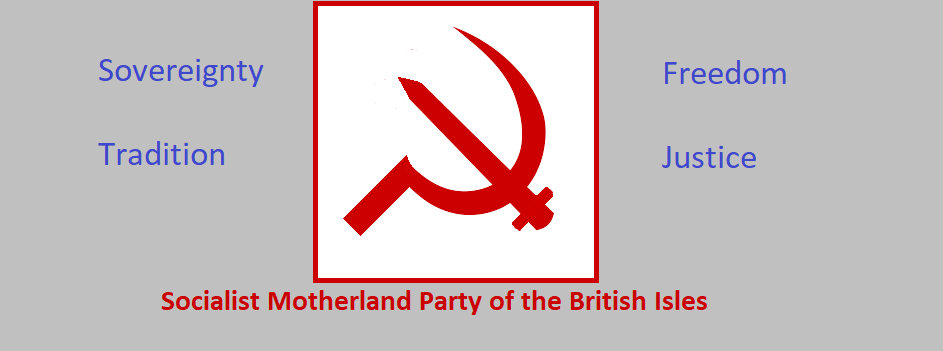








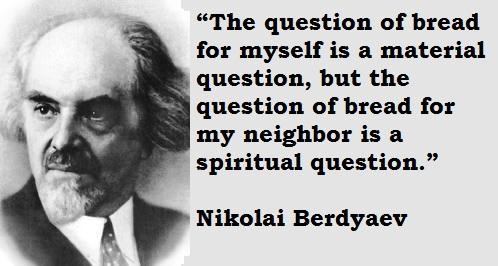






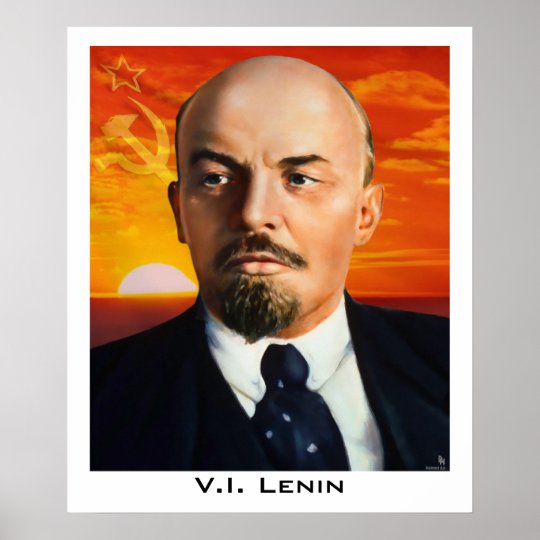


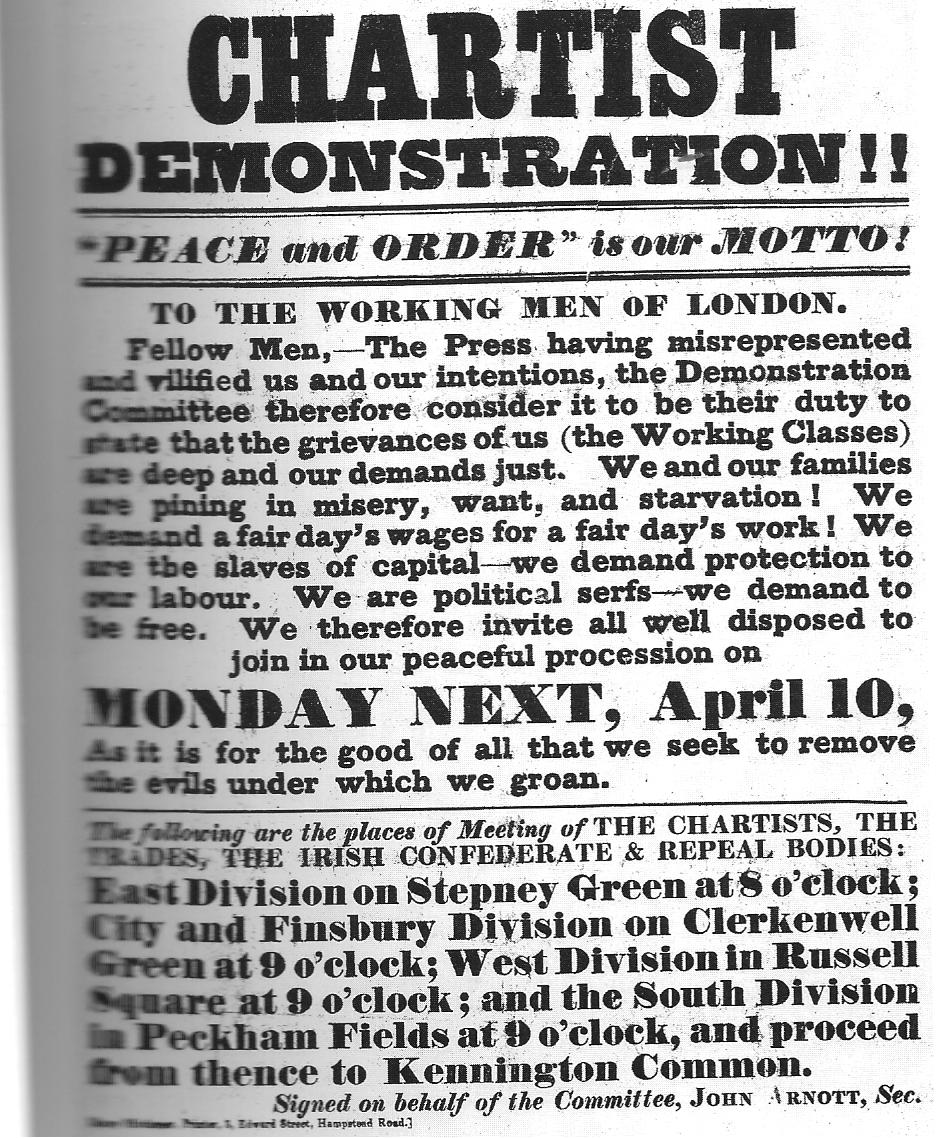
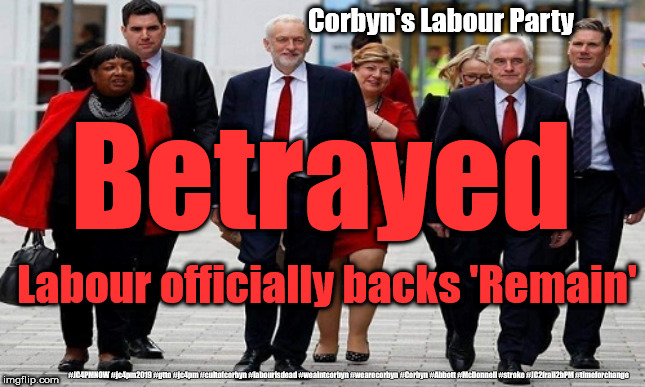

















.jpg)
